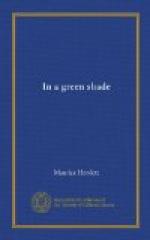“What joy would it not be to you, or to me, Miss Betham, to meet a Milton in a future state, and with that reverence due to a superior, pour forth our deep thanks for the noble feelings he had aroused in us, for the impossibility of many mean and vulgar feelings and objects which his writings had secured us!”
The Americans call that sort of thing poppycock, which seems a useful phrase. No doubt there was more of it, though it is precisely there, without subscription or signature, that the Editor of A House of Letters thinks fit to conclude. He has much to learn of the duties of editorship, among other things, as we shall have to note before long, reasonable care in recording and printing his originals. Upon that letter, at any rate, post if not propter, Miss Betham proposed to the philosopher that he should sit to her, and that, with some demur, he promised to do. An appointment was made to that end, and punctually broken. Then came this letter of excuse, which should have been worth many a miniature, being indeed a full-length portrait done by a master-hand:—
“Dear Miss Betham,—Not my will, but accident and necessity made me a truant from my promise. I was to have left Merton, in Surrey, at half-past eight on Tuesday morning with a Mr. Hall, who would have driven me in his chaise to town by ten; but having walked an unusual distance on the Monday, and talked and exerted myself in spirits that have been long unknown to me, on my return to my friend’s house, being thirsty, I drank at least a quart of lemonade; the consequence was that all Tuesday morning, till indeed two o’clock in the afternoon, I was in exceeding pain, and incapable of quitting my room, or dismissing the hot flannels applied to my body....”
This was no ordinary philosopher; but the chapter is not yet full.
He left Merton, he says, at five, walked stoutly on, was detained an hour and a half on Clapham Common, “in an act of mere humanity,” and finally reached Vauxhall.
“At Vauxhall I took a boat for Somerset House: two mere children were my Charons; however, though against tide, we sailed safely to the landing-place, when, as I was getting out, one of the little ones (God Bless him!) moved the boat. On turning halfway round to reprove him, he moved it again, and I fell back on the landing-place. By my exertions I should have saved myself but for a large stone which I struck against just under my crown and unfortunately in the very same place which had been contused at Melton (sic) when I fell backward after learning suddenly and most abruptly of Captain Wordsworth’s fate in the Abergavenny, a most dear friend of mine. Since that time any great agitation has occasioned a feeling of, as it were, a shuttle moving from that part of the back of my head horizontally to my forehead, with some pain but more confusion.”
The unction of that blessing called down upon his persecutor is truly Coleridgian. “Melton” is the Editor’s rendering of Malta, where Coleridge was when he heard of John Wordsworth’s drowning in 1805. He had then kept his bed for a fortnight, or so he told Mrs. Coleridge.




